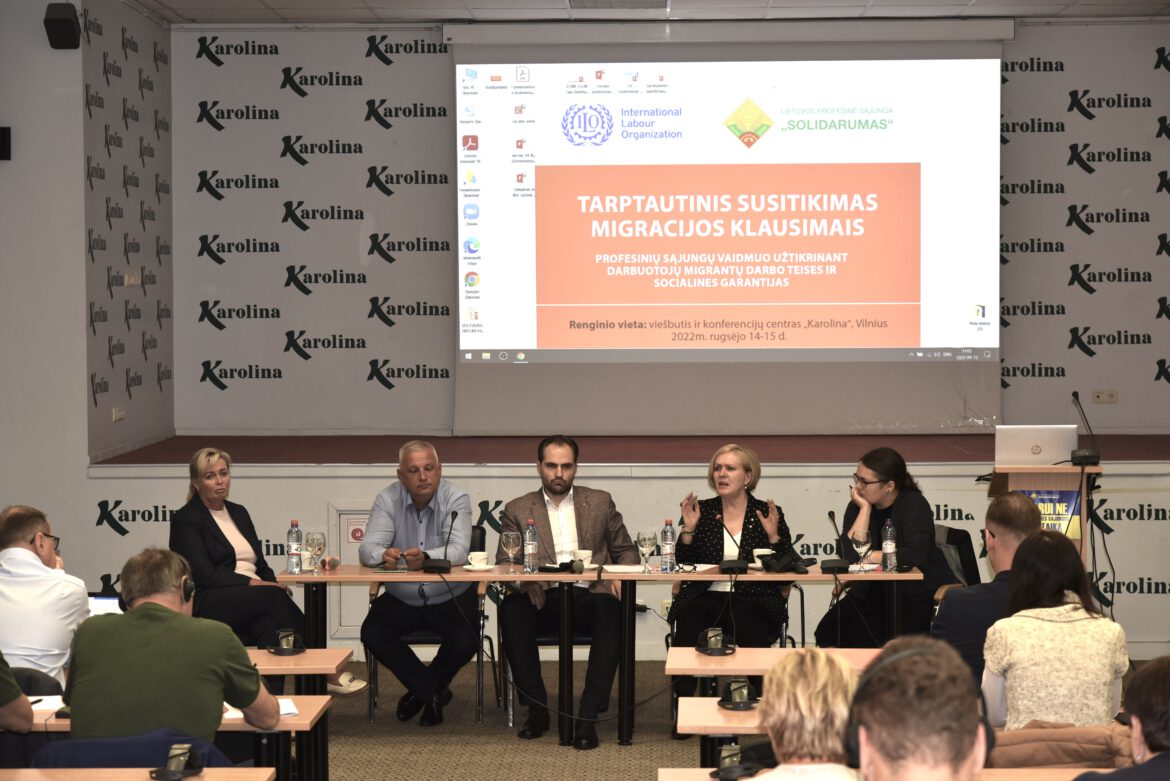The role of trade unions in ensuring the labor rights and social guarantees of labor migrants
14-15 September, 2022
The venue for the event was Hotel and Conference Center Karolina, Vilnius, Lithuania.
Taking part in it were 26 representatives of LTUSolidarumas, 3 Ukrainian trade unions, 3 Belarusian trade unions, and 5 guests.
On 14-15 September, 2022, an international meeting on migration issues was held in Vilnius. The conference was organized by the Lithuanian trade union Solidarumas in cooperation with the International Labor Organization (ILO).
The event was attended by Sergejus Glovackas, representative of the International Labor Organization, Desk Officer for Europe and Central Asia of the ILO Bureau for Workers’ Activities, ahuman rights lawyerVictor Hugo Ricco, Senior Specialist in ACTRAV,ILO; LTUSolidarumas members, representatives of trade unions of Ukraine, Belarus, and social partners
Daiva Kvedaraitė,LTUSolidarumas project manager,made a presentation about the project implemented in 2021entitled Trade unions for labor migrants. The target group of the project were labor immigrants coming to Lithuania from the third countries, primarilyfrom Ukraine and Belarus. The project goal was to improve the situation of labor immigrants by strengthening information provision and counseling,promote the role of trade unions in this process, provide guidelines for future activities. The establishment of theMigrant Information Centerfor labor migrants was identtified as one of the possible activities to go forward. During the implementation of the project, two cooperation agreements were signed between LTUSolidariumasand two Ukrainian trade unions – Confederation of Free Trade Unions of Ukraine (KVPU) and Federation of Trade Unions of Ukraine (FPU).
During the project implementation, an information campaign was organized, and individual counseling services were provided. Representatives of the project target group talked about their problems and described their needs. A survey of labor immigrants was conducted, the purpose of which was to collect information aboout their economic, labor and social conditions. During the survey, conducted in cooperation with the Baltic transport trade union Solidarumas, over 100 labor migrants were interviewed. Although the project came to an end, the information provided to labor migrants and the counseling services are continuously being carried out. Lately, most of the calls have been made by women who came to Lithuania as war refugees from Ukraine. It has been observed that the greatest challenges are mostly encountered by the individuals who seek employment through temporary employment agencies. The survey conducted among the leaders of LTUSolidarumas showed that trade unions should be more concerned with labor migrants. Yevgen Drapiaty, deputy chairman of the Ukrainian trade union FPU,provided information about the situation in Ukraine. Before the war, theMigrant Information Centerfor labor migrants was established and started its activities in Lviv. At that time, the majority of Ukrainians went to Poland, therefore information leaflets about working conditions and social guarantees and the trade union organizing labor migrants in Poland were published and distributed at the representative office,to meet the needs of labor migrants. After the outbreak of the war in Ukraine, the activities of the Migrant Information Centertemporarily took on a different character. Currently, it focuses on organizing humanitarian aid, gathering information about war refugees, as well as providing assistance to them. About 90 percent of the refugees who fledthe war are expected to return to their homeland.
Inga Balnanosienė, director of the Employment Service under the Ministry of Social Affairs and Labor of the Republic of Lithuania, presented the context in the Lithuanian labor market related to the situation of labor migrants from Ukraine. The director stated that the employment situation was improving. New forms of employment, such as teleworking, enjoy rising popularity. People want to work. However, they want decent employment and decent pay. It means that all of us are responsible ensuring them decent working conditions, she said. The director broke good news that 14 regional career centers would start functioning the following year According to the director, these career centres are expected to contribute towardsshaping a culture of lifelong learning. Lithuania still faces a challenge of regional differences; the rate of unemployment on the regional level is still high. The people who have been unemployed for a long time havelost motivation. On the other hand, Lithuania is a good example of integrating Ukrainian refugees into the labor market. Out of over 64,000 people who came to Lithuania from Ukraine. more than 17 thousandhave already been employed. Women account for 98 percent of the refugees from Ukraine. However, not all of them can seek employment, as many arrived with young children. Part of themhave a disability or are of retirement age.
The amendments to the Lithuanian labor law, which are relevant both for labor immigrants and Lithuanian labor market participants, were presented by Lina Bertlingė, a lawyer at LTUSolidarumas.
Victor Hugo Ricco presented the origins of the International Labor Organization (ILO) as one of the UN agencies, work methods and the products created. In 2015,the 2030 Sustainable Development Agenda was adopted. It contains 17 goals covering the three dimensions of sustainable development: economic growth, social inclusion and environmental protection. Goals 5, 8, 10, 13 and 16 are in particular related to migrants.
Goal 5. Achieve gender equality and the empower all women and girls;
Goal 8. Promote sustainable, inclusive and sustainable economic growth, productive employment and decent workPromote
Goal 10. Reduce inequality between countries and within and among countries;
Objective 13. Take urgent action to combat climate change and its impacts;
Goal 16. Promote peaceful and inclusive societies for sustainable development, empower all to demand justice and build effective, accountable and inclusive institutions at all levels
The core ILO Conventions for the safety and health of workers, i.e. Convention no. 155 On Occupational Safety and Health and Working Environment andConvention no.187 concerning thePromotional Framework for Occupational Safety and Health. The above Conventions are relevant for all employees. Lithuania has not ratified them, as well as several other so-called core ILO conventions, among them Convention No. 102 On Social Security (Minimum Standards) and The Social Protection Floors Recommendation No. 202. Convention no. 143 on Migrant Workers (Supplementary Provisions). Convention No. 190 On Eliminating Violence and Harassment in the World of Work, the Violence and Harassment Recommendation No. 206, – have not been ratified at all. During its existence, the ILO has adopted 190 Conventions, 6 Protocols and 206 Recommendations. Lithuania has currently ratified 44 ILO Conventions and 2 Protocols. Among them, there is only one of the so-called core ILOConvention, i.e. Convention No. 87 On Freedom of Association and Protection of the Right to Organise.
During the meeting, a discussion of social partners was also held. Taking part in it were: Gintaras Čiužas, chairman of the Baltic transport trade union Solidarumas, Povilas Drižas, head of the Long-distance Transport and Logistics Alliance (TTLA), Vilma Vaitkevičiūtė, representative of the Migration Department at the Ministry of Interior, Kristina Krupavičienė, chairperson of the LTUSolidarumas, Sergejus Glovackas, Desk Officer for Europe and Central Asia, ACTRAV. The discussion participants exchanged opinions about the advantages and disadvantages of migration. Migration brings social and cultural pressures that need to be taken into account in planning for future services. Migration also has the potential for bringing peoples together culturally but friction might occur if efforts are not made to dispel negative myths held by local people. The discussion participants talked about the measures to be undertaken by employers and employee representatives to make the workplace attractive to both local workers and labor migrants to stop social dumping and protect all workers.
Goda Neverauskaitė,a representative of the International Trade Union Confederation (ITUC/PERC), presented ITUC/PERC policy on migrant workers. In her presentation, she focused on the so-called Fair Recruitment Adviserinitiative launched by ITUC. It is a new web platform to help protect migrant workers from abusive employment practices, by providing them with peer-to-peer reviews about recruitment agencies in their country of origin and destination. that anonymously ranks recruitment agencies https://www.recruitmentadvisor.org/ The Confederation of European Trade Unions has established UnionMigrantNet– a network of contacts, where information is collected on where an employee can get information after arriving in the country of his/her destination.
Towards the end of the event,ILO representative S.Glovackas summarized thepresentations delivered over the two days of the conference and the discussions held. He stated that ILO started working with LTU Solidarumas some time ago, focusing on migration issues. Then, the project Trade Unions for Labor Migrantswas implemented by LTU Solidarumas in cooperation with ILO. and intends to continue working. During the implementation of the project, the position of the trade unions, the problems faced by labor immigrants, and the legal regulation were clarified and the ways to go forward were identified.ILO representative S.Glovackasreassured that the ILO would continue to provide methodological and technical assistance in providing relevant and updated information to labor migrants in Lithuania, Ukraine and Moldova. In these countries, trade unions have already established Migrant Information Centers for labor migrants. Kristina Krupavičienė, the chairperson of LTU Solidarumas, noted that both information provision and counseling of labor migrants is more of a voluntary and unpaid activity rather than the main function of the trade union. Most of the calls are made by people who face problems, the majority of them are not even members of trade unions. It is important for us that Lithuania complies with the internationaly adopted labor standards and ensures adequate protection to all workers. We have to make sure that in the future there are no headlines like „I fled the war in Ukraine, and from Lithuania I fled my employer” in our media.
V.H. Ricco emphasized that it is important to guarantee labor rights and social guarantees for all workers, regardless of whether they are local workers or labor migrants. He noted that it is important to strengthen the capacity of trade unions, their competencies and the ability to properly apply ILO legal instruments such as conventions, recommendations and protocols. It is also of great significance to enhance and empower the social dialogue, both tripartite and bilateral. Social dialogue should not be fragmentary, but a coherent and continuously functioning mechanism.
The International Labor Organization (ILO) was founded in 1919. ILO is the only specialized agency of the United Nations operating on a tripartite basis (governments, workers, employers). Guy Ryder was elected Director-General by the ILO’s Governing Body in May 2012 and was re-elected for another five-year term in 2017. In March 2022, the ILO Governing Body elected Gilbert F. Houngbo as the Organization’s 11th Director-General. He will take office in October this year.
ILO members has187member states.
The Republic of Lithuania has been a member of the ILO since 1921. Membership in this organization was renewed since October 4, 1991. Lithuanian interests are represented at the ILO by the Ministry of Social Security and Labor of the Republic of Lithuania. The ILO works to increase social justice for working people around the world. The activities of the ILO are focused on the implementation of the four strategic goals: adhere to the basic principles and promote rights at work; encourage decent employment and equal pay opportunities for men and women; enhance social security; strengthen social dialogue and tripartite cooperation.This organization provides international policies and programs to improve working and living conditions, develops international labor standards that should be followed by member states, conducts an extensive program of technical cooperation to assist governments in implementing relevant policies, and participates in training, education and research.
During its existence, the ILO has adopted 190 conventions, 6 protocols and 206 recommendations. So far, Lithuania hasratified 44 ILO conventions and 2 protocols.
Prepared by Daiva Kvedaraitė
Translated by Auksė Kuokštienė

 Skirkite 1.2% GPM Darbuotojų paramos fondui ir 0.6% PS "Solidarumas".
Skirkite 1.2% GPM Darbuotojų paramos fondui ir 0.6% PS "Solidarumas".